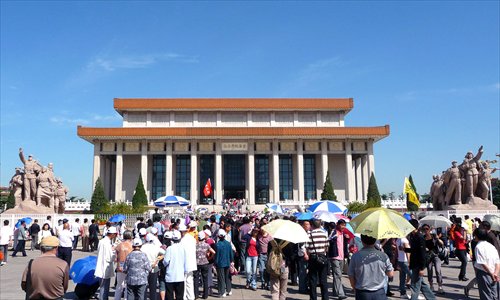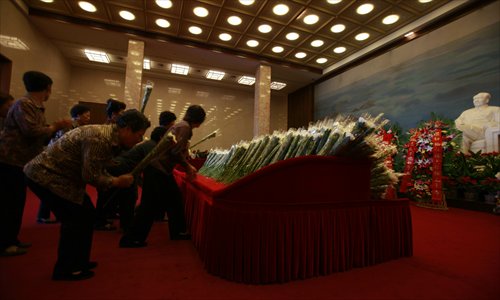Evoking a legacy

People visit the Chairman Mao Memorial Hall in Beijing on September 9, 2009. Photo: CFP
Read more in Daily Special(s): Mao’s 120th anniversary marked with events nationwideAs the 120th anniversary of the birth of former Chinese leader Mao Zedong falls on Thursday and preparations for celebratory events reach their climax, so are the arguments surrounding the assessment of Mao and his political legacy.
Speculation over whether the country's new leaders will follow their predecessors' practice and visit the Chairman Mao Memorial Hall to pay tribute to him has continued to grow.
Mao has had a vital influence in shaping the CPC's ruling ideology. Mao Zedong Thought, whose essence includes pursuing the mass line and sticking to the principle of independence, has been the Party's ruling creed through the country's revolution and construction.
However, this year, how the leadership celebrates the anniversary is being seen as a demonstration of its attitudes toward Mao, as well as a sign of its political direction.
Paying tribute to Mao and giving a speech on his major birth anniversary were customary for previous Chinese top leaders. Former leaders Hu Jintao, Jiang Zemin and Deng Xiaoping along with other senior officials, all paid visits to the Chairman Mao Memorial Hall in 2003, 1993 and 1983 respectively.
Grand and simple
However, an "unusual" incident triggered speculation that this custom could change.
Recently, a concert scheduled for December 26 at the Great Hall of the People was forced to change its title, according to Hong Kong-based Wen Wei Po and Mingpao newspapers.
The former title "The Sun is Reddest, Chairman Mao is Dearest" was changed to "Ode to the Motherland," and the sentence "This year is the 120th anniversary of Mao Zedong's birth" from the concert introduction was revised to "To embrace the coming 65th anniversary of the founding of New China," the reports said.
He Chenggao, a Shenzhen local who has been organizing red song and commemorative activities annually, said his application to hold activities marking this year's anniversary at the nearby Donghu Park was repeatedly turned down by the police.
While unloading exhibition materials from the car to start the activities, he was taken away by police last Sunday at the park, he told the Global Times.
"They said I was being disorderly in a public place and that's the reason they keep turning down my application," He said.
From peers, he also heard that similar activities have been disrupted in several other cities like Guangzhou, Chongqing, Shenzhen and Nanjing, which hasn't happened in the past.
In addition, some Weibo users also complained that their posts promoting the commemorative activities were blocked without any reasons being given.
Quoting the organizers of commemorative activities, the Hong Kong newspapers said the authorities have tightened related censorship and prolonged approval times.
Xu Shaolin, an independent commentator, told the Global Times that ceremonies concerning Mao are an especially sensitive matter in China right now.
"The leadership is cautious about this matter. When Xi visited Hunan Province, he pointed out that activities need to be grand and simple at the same time," he said. "The leadership hopes people from the left and right are both happy, but I think that will be difficult."
Some people have also linked this caution to the downfall of Bo Xilai, former Party chief of Chongqing and a strong admirer of Mao.
Bo launched a series of campaigns including singing red songs and cracking down on organized crime, which was seen as targeting wealthy private enterprises.
In November 2010, the municipality declared a new plan, requiring all 750,000 college students in the city to do four months' social practice activities, including living and working in the countryside and working at grass-roots enterprises for one month.
The activities were viewed as a movement aimed at reviving Mao's tactics and policies, which had drawn great praise from Mao's supporters, as well as concerns that reverting to the old ways would lead to chaos.
Soon after it was announced that Bo was to be dismissed from his post in March 2012, the Maoist website Utopia wyzxsx.com and other websites that strongly defended Bo's views were shut down.

Visitors pay tribute to a Mao statue inside the Chairman Mao Memorial Hall on September 9, 2009. Photo: CFP
Commemorative dilemma
A day before the anniversary, Li Jianxing, a 57-year-old retired driver from Xingtai, Hebei Province, came to Tiananmen Square to pay tribute to Mao at the Chairman Mao Memorial Hall
"People like me were brought up in the Mao Zedong era, and we have a deep emotional attachment to him," he told the Global Times.
Li thinks Mao not only had a brilliant military mind but also made great achievements in literature. His emotional attachment to Mao comes both from respecting him as an individual as well as nostalgia for the era he grew up in, Li said.
Since the Chairman Mao Memorial Hall was completed in 1977, a year after Mao's death, official data shows that it has had more than 200 million visits.
Each year, on the anniversaries of Mao's birth and death, commemorative activities are held across the country, reaching their peak during major anniversaries, and include events ranging from parties, dramas and TV specials to symposiums and exhibitions. A new 50-episode TV series, Mao Zedong, began airing on CCTV Wednesday evening.
Dai Cheng, the head of a red song association in Changzhou, Jiangsu Province, organized a concert at the Changzhou Grand Theatre on Monday, and he plans to go to Beijing to pay his respects to Mao on that day.
"We want to show people what Chairman Mao did back then through historical songs," he told the Global Times.
Against the background of a high-profile austerity campaign, some of the more large-scale celebrations have been criticized as publicity stunts aimed at boosting tourism.
In 2012, in order to prepare for the 120th anniversary of Mao's birth, his hometown Xiangtan in Hunan Province plans to spend 15.5 billion yuan ($2.55 billion) on 16 projects linked to the occasion, the Changsha Evening News reported.
These include the renovation of the Mao memorial and the establishment of tourism centers in Shaoshan, as well as environmental improvement around Mao Zedong Square and preservation work on his former residence.
Some people were accused of using pro-Mao events for profit. Some reports alleged that the Utopia website was funded by the local government. Rao Jin, founder of m4.cn, whose predecessor anti-cnn.com was established in 2008 to counter Western media's partial reports on China, was accused by his colleagues of using the website to accumulate wealth and seek connections, according to Southern Weekly.
Controversial assessment
The assessment of Mao and his political legacy remains a controversial issue. Most people agree with the official view that his legacy was 70 percent positive and 30 percent negative, which is echoed by latest survey findings obtained by the Global Times Poll Center.
With a growing number of people discussing public affairs and politics, as well as social media thriving among younger Chinese, ideological debates have been pushed to the margin.
Extreme conservatives think China should revert to Mao-era ways and oppose radical reforms, while extreme liberals suggest that China should completely implement a western-style system of democracy.
Xu agreed that views on Mao over the years have been greatly influenced by the development of the Internet, as new facts about Mao come to the surface, such as how many people starved to death during the Great Leap Forward.
Some scholars also pointed out that Mao's radical diplomatic policies in later years resulted in great chaos and isolation for the country.
Others, however, seem to pine for these hard-line policies. During demonstrations against Japan's attempt to "nationalize" the Diaoyu Islands in September 2012 in Beijing, some protesters were seen holding portraits of Mao Zedong and chanting "Chairman Mao, we miss you."
Xu said many of Mao's supporters are from the bottom of the social ladder who are discontent about society and corruption.
Dai believes that some officials have betrayed the objective of wholeheartedly serving the people. "For some government officials, power seems to come with money. Back in Chairman Mao's era, power had nothing to do with money."
"We must not abandon Marxism-Leninism and Mao Zedong Thought, otherwise, we will lose our foundation," CPC General Secretary Xi Jinping said during a speech in November last year.
Mao's influence is still evident in China today, and the Party's basic political system was laid out during his era. People's recognition of Mao contains their recognition of the CPC, said Zhao Zhikui from the Academy of Marxism under the Chinese Academy of Social Sciences.
Xi has adopted terms of Mao's rhetoric since he became the Party chief. He announced a host of campaigns to purify the Party, including "mass line" and "rectification" movements such as self-criticism. However, his determination to carry out far-reaching political reforms displayed at the recent Party plenary session showed that he is no conservative, according to observers.
When commenting on the drama Mao Zedong and His Eldest Son, which relates to Mao Anying who was killed while serving with the Chinese army in the Korean war, Sima Nan, a popular Maoist scholar and blogger, burst into tears several times, according to a video circulating on the Internet.
He suggests that the government subsidize such plays and that officials today learn about Mao's selflessness and disciplinary requirements for their children.